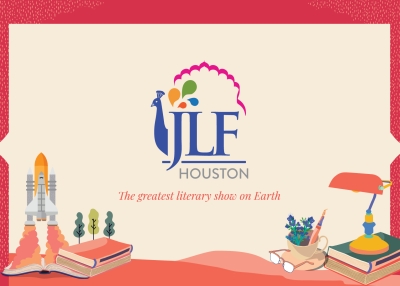To Express and Engage: The Jaipur Literature Festival Returns to New York
NEW YORK, Sept. 13, 2023 — For the seventh year, the Jaipur Literature Festival (JLF) — which has been described as the “greatest literary show on Earth” — returned to New York City. The fourth day of programming was hosted at Asia Society, and featured conversations with three authors followed by music from the Anriudh Varma Collective Classical Quintet.
Mathematician and novelist Manil Suri opened the evening in discussion with academic Patrick Honner. During this session, Suri unpacked the origins behind his recent book The Big Bang of Numbers: How to Build the Universe Using Only Math, which was shortlisted for the 2023 PEN/E.O. Wilson Literary Science Writing Award. When answering why he wanted to use math to explain the construction of the universe, Suri shared that “since I’m a storyteller I was looking at a story, I wanted it to be a narrative, and the traditional way that math books would have a narrative would be to look at the history of mathematics... My question was, is there another way to do it, and that’s where I started thinking. Can you really build up everything just using mathematics?”
The next session, “Writing Tibet, Remembering Tibet,” involved a conversation between Bard College Assistant Professor Dominique Townsend, Tibetan poet Tsering Wangmo Dhompa, and Tibetan writer and translator Tenzin Dickie. The three women discussed Buddhism’s historical and modern influence on Tibetan literature, which they believe is largely a product of the history of textual production in Tibetan monasteries. “So much of the language of everyday Buddhism has shaped our ways of talking about exile,” shared Dhompa. “The idea that exile is a bardo, this state of in- betweenness, the state after death and before the next life. And that is a trope that comes up very often.” She, Townsend, and Dickie also unpacked the commercialization of Tibetan Buddhism in the mindfulness and meditation industry, leading Dickie to ask: “why are people so interested in our culture but not our suffering?”
Politician and author Shashi Tharoor talked to author and journalist Seema Sirohi in the last session of the evening. The topic of conversation was the paradoxes of India today, particularly within the political apparatus, which was the topic of Tharoor’s book The Paradoxical Prime Minister: Narendra Modi and His India. Tharoor shared his concerns regarding the recent erosion of India’s autonomous institutions, like the media, that are meant to be “repositories of neutrality and integrity above the political fray.” He stated: “We’re going around claiming that we are the mother of democracy – which is a claim [that] others can also make, the Greeks in particular — but I don’t think that too many mothers would treat their children this way.” Despite these internal paradoxes, Tharoor shared his hopes for India's role as a peacemaker in today’s multipolar world.
The Anirudh Varma Collective Classical Quartet closed the evening with a spontaneous and impromptu musical experience. Their performance emerged from their passion for reimagining traditional Indian classical compositions within a contemporary Baithak framework. A reception was held afterwards in the Garden Court, which was a wonderfully lighthearted close to an intellectual evening of dialogue.
At Asia Society Texas, JLF Houston featured award-winning film-maker Mira Nair, celebrated author Chitra Banerjee Divakaruni, award-winning journalist Anjan Sundaram, among other panelists and performers. Topics ranged from book censorship, to cosmological discoveries, to the partition of the Indian subcontinent.

![[JLF 2023] Welcome Address](/sites/default/files/styles/400x286_video/public/2023-09/JLF2023Welcome.jpg)
![[JLF 2023] A Universe Built on Math: ‘The Big Bang of Numbers’](/sites/default/files/styles/400x286_video/public/2023-09/JLF2023ManilSuri.jpg)
![[JLF 2023] Writing Tibet, Remembering Tibet](/sites/default/files/styles/400x286_video/public/2023-09/JLF2023Writing%20Tibet%2C%20Remembering%20Tibet_0.jpg)
![[JLF 2023] The Paradoxes of India](/sites/default/files/styles/400x286_video/public/2023-09/JLF2023%20The%20Paradoxes%20of%20India.jpg)
![[JLF 2023] The Anirudh Varma Classical Quartet Performance](/sites/default/files/styles/400x286_video/public/2023-09/JLF2023%20AVC%20Classical%20Quartet.jpg)
